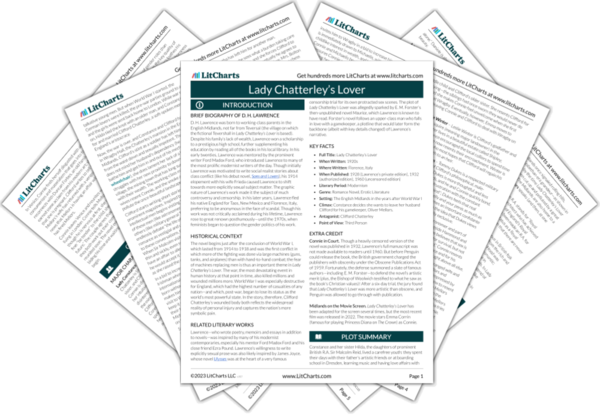Clifford Chatterley’s wheelchair symbolizes the destructive, emasculating dangers of mechanical technology. After Clifford is wounded and paralyzed from the waist down (a result of his time fighting in World War I), he becomes dependent on an expensive, high-tech wheelchair for mobility. In what is widely considered to be evidence of Lawrence’s own ableist views, Clifford’s inability to walk or have sex is equated with a lack of masculinity; at one point, his wife’s paramour, Oliver Mellors, mocks Clifford for literally lacking “balls” and thus having “none of that spunky wild bit of a man in him.” Clifford’s wheelchair is then presented as the way he compensates, as he turns to a machine to replenish his diminished manhood.
Just as the wheelchair represents the novel’s anxiety that men are being turned into machines, it also demonstrates the threat mechanization poses to nature. In one particularly important scene, Clifford’s wheelchair crushes the flowers underneath it as he traverses the Wragby grounds, turning the abstract danger of technology into something tangible and urgent. In another moment, Clifford’s wheelchair breaks down, and he himself breaks down, too, screaming at Mellors and Connie to fix the machine so that he can feel less powerless. By this logic, it is unsurprising that Lawrence presents Mellors’s strong body and dislike of mechanization as the antidote to Clifford’s failures—though again, it is important to note the ableist and gender-normative thinking behind Lawrence’s use of disability as symbol of emasculation and deterioration.
Clifford’s Wheelchair Quotes in Lady Chatterley’s Lover
The fault lay there, out there, in those evil electric lights and diabolical rattlings of engines. There, in the world of the mechanical greedy, greedy mechanism and mechanized greed, sparkling with lights and gushing hot metal and whirring with traffic, there lay the vast evil thing, ready to destroy whatever did not conform. Soon it would destroy the wood, and the bluebells would spring no more. All vulnerable things must perish under the rolling and running of iron.
He thought with infinite tenderness of the woman. Poor thing, she too had some of the vulnerability of the wild hyacinth, she wasn't all tough rubber goods and platinum, like the modern girl. And they would do her in! As sure as life, they would do her in as they do in all naturally tender life. Tender! Somewhere she was tender.
And the chair began to advance slowly, joltingly down the beautiful broad riding over with blue encroaching hyacinths. Oh last of all ships, through the hyacinths in shallows! Opinions on the last wild waters, sailing in the last voyage of our civilization! Wither, oh weird wheeled ship, your slow course steering. Quiet and complacent, Clifford sat at the wheel of adventure: in his old black hat and tweed jacket, motionless and cautious. Oh captain, my Captain, our splendid trip is done! Not yet though! Downhill in the wake, came Constance in her grey dress, watching the chair jolt downwards.
“Did you hate Clifford?” She said at last. “Hate him, no! I’ve met too many like him to upset myself hating him. I know beforehand I don’t care for his sort, and I let it go at that.”
“What is his sort?”
“Nay, you know better than I do. The sort of youngish gentleman a bit like a lady, and no balls.”
“What balls? Balls! A man's balls!”
She pondered this.
“But is it a question of that?” she said, a little annoyed.
“You say a man’s got no brain, when he's a fool: and no heart, when he's mean; and no stomach when he’s a funker. And when he’s got none of that spunky wild bit of a man in him, you say he’s got no balls when he’s sort of tame.”












